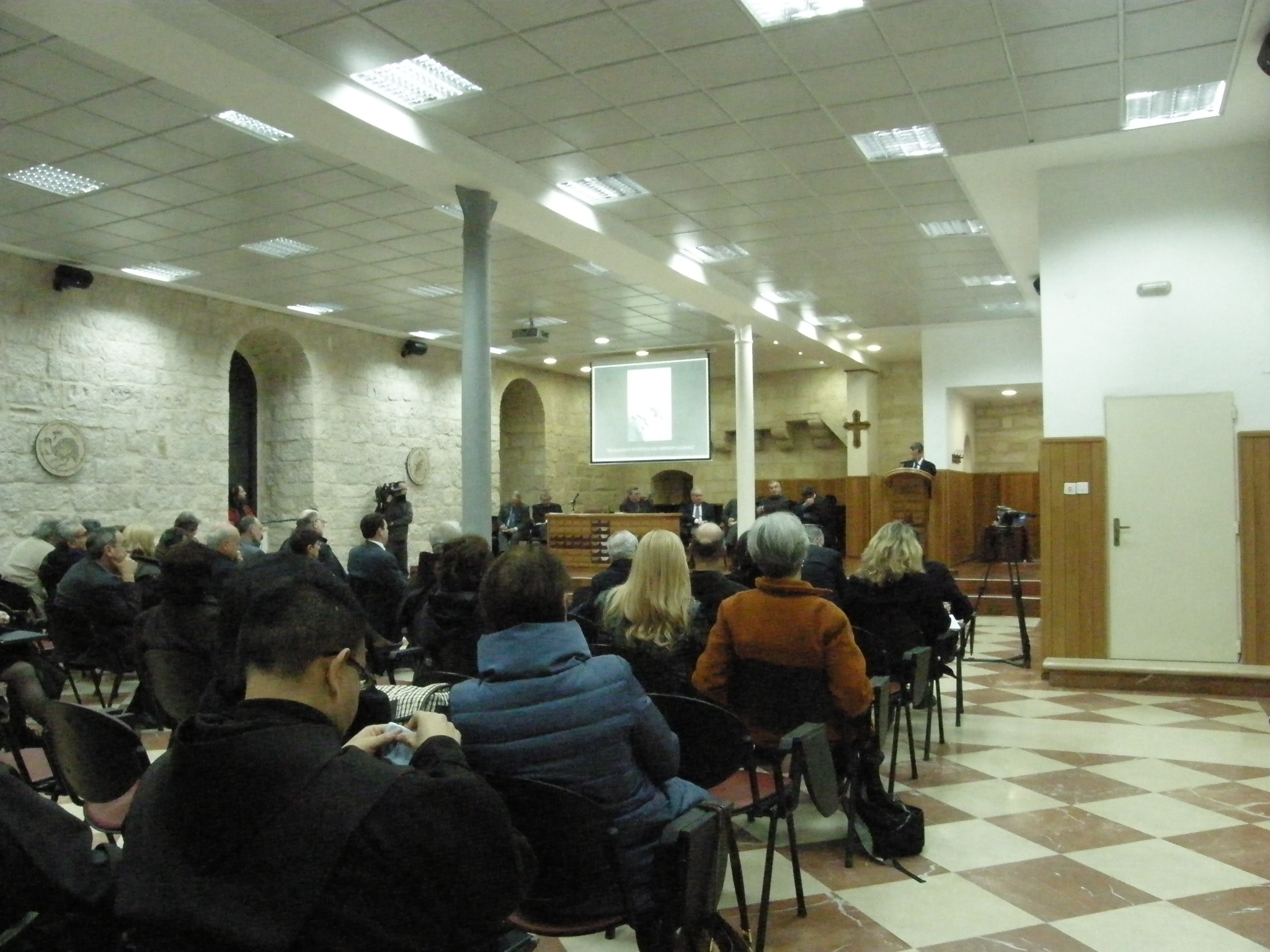
“A book full of common sense and rich in humanity.” This is how Massimo Pazzini, dean of the Studium Biblicum Franciscanum (SBF), defined the book by Vannino Chiti, Deputy President of the Italian Senate, which was presented last night at St. Saviour’s Convent.
The event, organized in collaboration with the John Paul II Foundation and ACLI, which are certainly not new to initiatives involving Middle Eastern countries, was greatly appreciated by all those present, including many students from the SBF.
The “host” of the evening was Brother Ibrahim Faltas, the Bursar of the Custody, who in the name of his friendship with all those present and the long-established collaboration with various Tuscany-based associations for the Holy Land, said that he was happy to have been able to host the event and represent the Custody in the absence of the Father Custos.
An important contribution from Italy on the theme of interreligious dialogue, peace in the Middle East and religious freedom, to quote the Consul Giampaolo Cantini, “Religioni e Politica nel mondo globale” [Religions and Politics in the global world] is a book of an extraordinary openness that studies and suggests key points for an efficacious dialogue between politics and religions in a globalized world and in continuous change. This theme of dialogue between religions and politics is particular dear to the Custody due to the complexity that characterizes the situation in which it operates.
According to Father Pazzini, the strong point of the book is the accent which it continually places on the human person as the essential starting point of every dialogue.
Mons. Franco Agostinelli, Bishop of Grosseto, was also present and he picked up some of the most interesting ideas in the book: the invitation to find the convergences between religion and politics, the need for a new role of religion in the widest public and social dimension, the conception of “new humanism” understood as the awareness of finding space for the more spiritual aspect of man as well and for his constant need for transcendency.
These are highly topical themes, as Andrea Olivero, National President of ACLI, also underlined, for which the very way of doing politics must be “rethought”, in the perspective of returning to a common and collective vision, to build up the foundations for a broader design.
Lastly, the author speaks of shared ethics, a common vision and itinerary that move away from separation and irreconcilability as friend-foe and from sterile fundamentalisms that lead to violence.
A fine challenge for contemporary society which finds fertile ground here in the Holy Land and an ideal laboratory where work can be started.
MGS
The event, organized in collaboration with the John Paul II Foundation and ACLI, which are certainly not new to initiatives involving Middle Eastern countries, was greatly appreciated by all those present, including many students from the SBF.
The “host” of the evening was Brother Ibrahim Faltas, the Bursar of the Custody, who in the name of his friendship with all those present and the long-established collaboration with various Tuscany-based associations for the Holy Land, said that he was happy to have been able to host the event and represent the Custody in the absence of the Father Custos.
An important contribution from Italy on the theme of interreligious dialogue, peace in the Middle East and religious freedom, to quote the Consul Giampaolo Cantini, “Religioni e Politica nel mondo globale” [Religions and Politics in the global world] is a book of an extraordinary openness that studies and suggests key points for an efficacious dialogue between politics and religions in a globalized world and in continuous change. This theme of dialogue between religions and politics is particular dear to the Custody due to the complexity that characterizes the situation in which it operates.
According to Father Pazzini, the strong point of the book is the accent which it continually places on the human person as the essential starting point of every dialogue.
Mons. Franco Agostinelli, Bishop of Grosseto, was also present and he picked up some of the most interesting ideas in the book: the invitation to find the convergences between religion and politics, the need for a new role of religion in the widest public and social dimension, the conception of “new humanism” understood as the awareness of finding space for the more spiritual aspect of man as well and for his constant need for transcendency.
These are highly topical themes, as Andrea Olivero, National President of ACLI, also underlined, for which the very way of doing politics must be “rethought”, in the perspective of returning to a common and collective vision, to build up the foundations for a broader design.
Lastly, the author speaks of shared ethics, a common vision and itinerary that move away from separation and irreconcilability as friend-foe and from sterile fundamentalisms that lead to violence.
A fine challenge for contemporary society which finds fertile ground here in the Holy Land and an ideal laboratory where work can be started.
MGS

